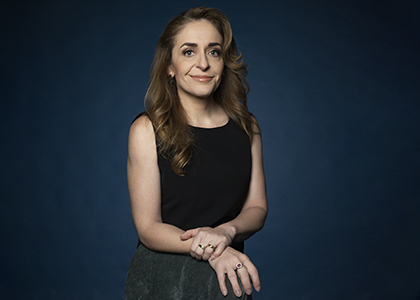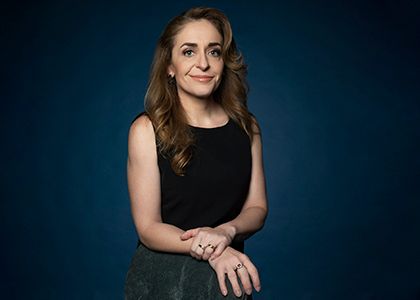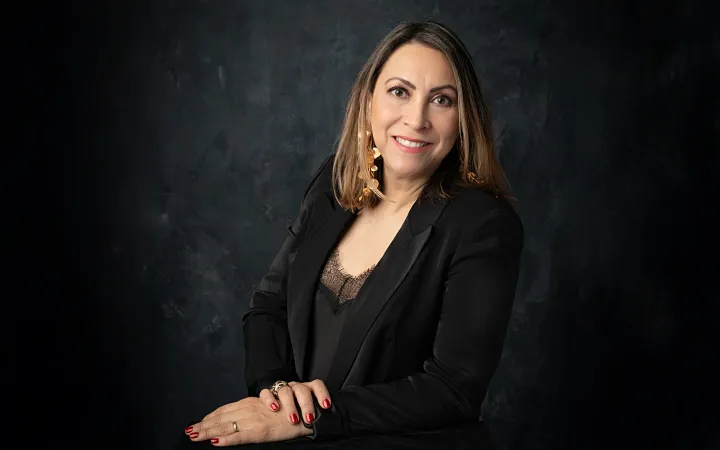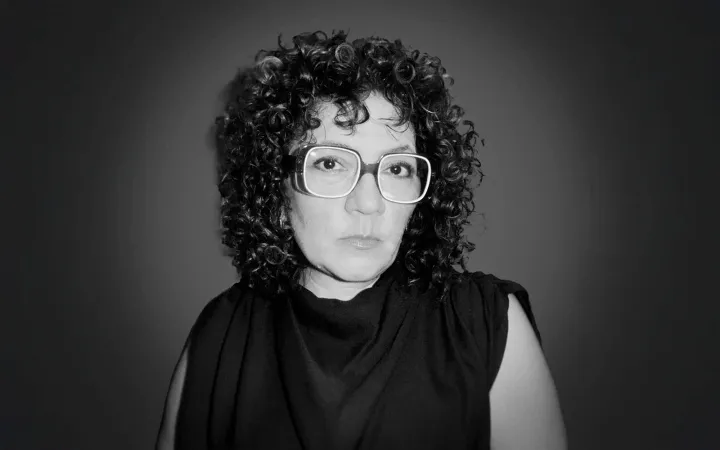Por Bárbara Anderson
-Rápido, debes decir a la cámara quién eres… “Yo soy..”
Con la velocidad que hace todo en su vida Steph Lewis -la mastermind detrás de esta plataforma llena de talento donde - me soltó esa frase para decir en un video que se usará en una futura campaña.
Tal vez ella no lo notó pero comencé diciendo ‘periodista’, ‘editora’, luego ‘generosa’... hasta que mi hijo Bruno -que estaba de metiche en la sesión- interrumpió y me dijo que le tenía que poner el acento a la letra ‘o’ de la palabra yo y decir la verdad “mamá: dí que eres divertida”.
¿Quién soy? ¿una profesión o una característica de mi personalidad? ¿Qué es más potente en mi vida?
Minutos antes, la fotógrafa convocada para este proyecto, una talentosa joven que conozco de cuando pasé por la aventura/desventura de La-Lista/The Guardian, me preguntó mientras ponía una nueva batería a su cámara: “¿y ahora dónde estás trabajando? ¿qué estás haciendo?” “No estoy en ningún lugar de fijo: colaboro en Expansión, Opinión 51, dirijo mi propio sitio de noticias de discapacidad ‘Yo También’ y he estado escribiendo algunos libros…”.
Me di cuenta que, a medida que nombraba cada una de esas chambas, iba bajando el tono de voz con cierta sensación de fracaso. Y pensé “claro, como no estoy en ningún corporativo, en ningún espacio físico donde formo parte de un staff permanente, siento que todo lo demás que lleva mi firma no es tan valioso.
Fue una epifanía. Lo que hago no es menor, pero parece menor si no va pegado a una marca (que no es la mía personal), a un corporativo que me envuelva.
Llevo dedicadas a mi profesión -que a diferencia de otros oficios no sabe de fines de semana y poco de vacaciones- unas 81 mil horas desde que publiqué mi primer trabajo hasta ahora.
No tener gafete me hizo sentir que estaba en el lugar equivocado.
Parece que no alcanza con decir que una es periodista, sino que inmediatamente lo que importa mucho más es ¿dónde?
¿Les ha pasado en sus carreras?
—------------
Hace unos días, una amiga que es una alta ejecutiva en una multinacional mexicana, me decía que en una charla con su mentor, éste le preguntó cuál era su hobbie, lo que hacía más allá de su familia y el trabajo. “No supe qué contestar, porque he estado tan enfocada en cumplir, en superar las metas, en hacer todo y más en mi casa y en mi puesto de trabajo que ¡¿en qué momento tengo chances de un hobbie o de otra actividad?!”, me dijo entre desconcertada y vacía a sus más de cincuenta años. La misma empresa que le pide cada trimestre resultados “citius, altius, fortius”, esa misma que ahora la quiere de regreso en la oficina sin cosas raras como eso de ‘modelo híbrido’ porque ya la pandemia pasó, es la que no entiende que no haya encontrado algo más que la apasione y a la que dedique su tiempo cuando con angustias logra terminar todos los proyectos robándole horas a su casa, a su esposo y a su hijo.
Ahora se ha puesto la meta de ver más películas, de obligarse a sumar cine en su agenda para tener algo que contestar en su siguiente entrevista y que no la tilden de ‘aburrida’ o ‘menos completa’.
La escuché y me di cuenta que no sentirse sola en esas disyuntivas es un consuelo significativo y digno. No es ‘mal de muchas, consuelo de pocas’, sino que me dió una perspectiva extra: tampoco garantiza nada ni da más satisfacción el estar bajo un mega cartel de una marca, con gafete y correo electrónico con firma corporativa después del arroba.
“Al menos tú sabes tejer… yo ni eso”, me dijo pensando que yo dedico tardes de solaz y esparcimiento a los estambres. La alivié al reconocer que llevo mucho tiempo sin poder hacer nada ‘off niños’ y ‘pendientes del día a día’ que incluya un par de agujas.
Solo le dije una frase que escuché en una conferencia para padres de niños con discapacidad y cómo animarse a vivir una realidad ‘no estándar’. “Cuando cambia la música, cambia el baile”, le dije, “solo que a veces nos hacemos sordas y no queremos escuchar que ya no está sonando el mismo ritmo o no nos atrevemos a probar pasos nuevos, a salirnos de la norma”.
Se lo solté con un café de por medio y ella asintió con la cabeza entendiendo que eso pasa y es importante ‘leerlo en cada uno’, pero me di cuenta que esa misma recomendación me la debería hacer yo misma.
Que no me diera pena o me hiciera sentir devaluada decir ante la pregunta de cajón “¿y ahora qué haces”, que ‘sólo’ había escrito dos libros en menos de un año (en una editorial internacional que recibe 500 manuscritos por semana y que publica sólo 1000 títulos anuales), que cada día dirijo un sitio web que recibe 60 mil visitas al mes o que investigo y escribo columnas de opinión para otros medios. Sin olvidar los miles de roles domésticos que aburriría enumerar pero que también ocurren en estéreo.
Muchas de las cosas que he hecho, qué he logrado, tenían como meta enorgullecer a mis padres. Conseguir un ascenso o lograr ‘el’ reportaje más increíble significaba escuchar su voz felicitándome.
Hoy ninguno de ellos está. Y me he descubierto en estos últimos meses desde que murió mi mamá, marcando en automático su teléfono y cortando al primer ring, porque en esa casa ya no hay nadie que atienda.
—-------------------
Me encantan los análisis que hace The School of Life, un instituto dedicado a comprender y mejorar nuestra inteligencia emocional, fundado por el filósofo Alain de Botton.
En su último libro “The career workbook” habla del tema y analiza que nuestras crisis profesionales se potencian por la sensación de que nuestros talentos no son reales a menos que: a) nos hagan ganar dinero, b) los extraigamos a tiempo completo y c) no sean solo pasatiempos. Lo que dice de Botton es que el trabajo se ha convertido en ese rol donde nuestros talentos y aptitudes satisfagan las necesidades del mundo, lo que queremos sobre todo es un trabajo significativo, lo que significa uno que alivie el sufrimiento o aumente el placer de otras personas.
¿Hacemos realmente lo que sentimos? ¿Cuáles son los trabajos que hacen otros que nos dan envidia y por qué?
El libro invita a que tengamos todos un ‘Diario de la envidia’, donde vayamos anotando los nombres y las tareas que hacen otros y que nos encantaría a nosotros hacer. E incluso otra lista, otro diario, con el trabajo que están haciendo las personas que más nos gustaría ver fracasar.
The School of Life reflexiona en este libro sobre nuestros intereses infantiles, eso que respondíamos cuando nos preguntaban qué queríamos ser cuando fuéramos grandes, porque eso se responde desde una etapa donde somos libres de las dos grandes ansiedades que boicotean nuestros proyectos más alocados: la necesidad de dinero y el anhelo de estatus.
“El verdadero éxito puede significar, a los 50 años, haber regresado de manera clave a lo que nos gustaba a los cinco años: hacer algo divertido. Es por eso que solemos ser tan catastróficamente modestos acerca de lo que merecemos lograr.”
Tal vez, puesto de esta manera sea más fácil identificar qué nos hace felices, qué nos completa en todo sentido, qué nos hace decir (con acento en O, como recomienda mi hijo) YO SOY, -además de los gafetes que me he colgado y alguna vez me colgaré, de lo firmado y alguna vez firmaré- “una persona divertida”.

Las opiniones expresadas son responsabilidad de sus autoras y son absolutamente independientes a la postura y línea editorial de Opinión 51.






Comments ()